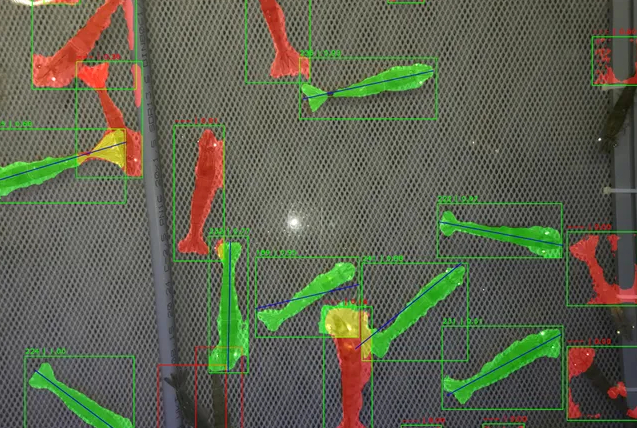November 26, 2025 | 22:42 GMT +7
November 26, 2025 | 22:42 GMT +7
Hotline: 0913.378.918
November 26, 2025 | 22:42 GMT +7
Hotline: 0913.378.918

The computer vision system measuring the length of individual shrimp. Photo: thefishsite
The team of researchers have developed a system based on computer vision – a field of artificial intelligence (AI) that enables computers to derive meaningful information from digital images and videos – that can count the number of shrimp and measure their length at up to 95 percent accuracy
Led by the Alfred Wegener Institute, Helmholtz Centre for Polar and Marine Research (AWI) – in partnership with shrimp farming pioneers Oceanloop and Sander Holding, experts in water treatment systems – the MonitorShrimp project has involved a team of researchers and engineers who have developed a computer-vision-based system that can count the number of shrimp and measure their length at up to 95 percent accuracy. This was achieved in real-time and under actual farming conditions, i.e., under high stock densities and in cloudy water.
The system offers aquaculture companies a better understanding of how their livestock is performing, but also how to farm them ethically. The new technology was developed to meet the needs of Europe’s land-based shrimp farms, which are increasingly focused on improving sustainability and animal welfare.
The first prototype was tested at Oceanloop’s R&D farm in Kiel, Germany, in 2022. A modern smartphone, installed above the water’s surface, automatically photographed the shrimp once a minute and transferred the live data to a local server. Then, computer-vision-based algorithms were used to count the number of shrimps in each image and measure the lengths of individual shrimp. The resulting information was sent to the fish-farming software package, making it possible to optimise growth and feeding models based on live data.
In addition, the researchers were able to visually detect stress symptoms in the shrimp – a highly useful function, as Dr Bert Wecker, Co-CEO of Oceanloop, explained in a press release: “This function is used as an early warning system, but also to validate our stock density model. This bleeding-edge technology allows us to more precisely determine the density for each size group, which improves survival rates, growth, and feed efficiency.”
Dr Stephan Ende, the project’s coordinator at the AWI, stressed the importance of monitoring livestock mortality, especially in aquaculture: “The mortality rates, which can range from 13 to 26 percent in salmon and can be up to 50 percent in shrimp, are substantially higher than with any other type of livestock. Online monitoring allows aquaculture companies to more quickly respond to signs of stress among their stock.”
“The ability to monitor the shrimp’s growth and health with live data in real-time will on the one hand help to reduce risk in aquaculture. At the same time, it will offer complete transparency regarding the biomass, making it possible to optimise the value chain from farming to processing to sale,” added Dr Fabian Riedel, co-founder and Co-CEO of Oceanloop.
Tomasz Kowalczyk, founder and CEO of NeuroSYS, experts in AI, machine learning, and digitalisation who contributed to algorithm development for the project, concluded: “Technological advances can change companies and entire sectors. We’re ready to be part of that transformation and are working to introduce the advantages of artificial intelligence and deep learning to the shrimp-farming sector.”
(The fishsite)

(VAN) A new study reveals how the simultaneous effects of ocean acidification, salinity and loss of oxygen are making the world more fragile.

(VAN) Hopes are growing that the creation of the first 3D turkey gut model could be a turning point in the battle against the virulent blackhead disease.

(VAN) Tyson, America’s biggest meat supplier, plans to shutter one of its largest beef processing plants as the industry continues to struggle with low cattle supplies and political pressure from Washington.

(VAN) New FAO study shows how digital solutions are empowering farmers and fishers to prevent losses and build resilient agrifood systems.

(VAN) Brazil's COP30 presidency pushed through a compromise climate deal on Saturday that would boost finance for poor nations coping with global warming but that omitted any mention of the fossil fuels driving it.

(VAN) Poultry farmers in the UK have been warned that they could face one of the worst winters yet for bird flu.

(VAN) Prices of main-crop paddy have risen sharply, with jasmine rice hitting 16,100 baht per tonne — the highest level in years.